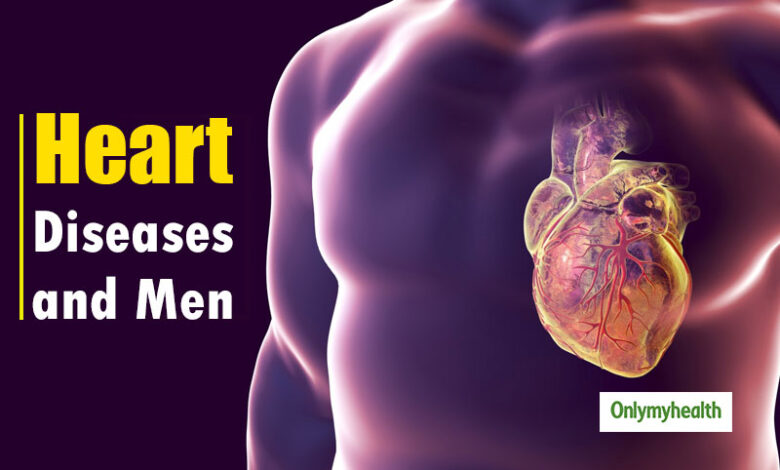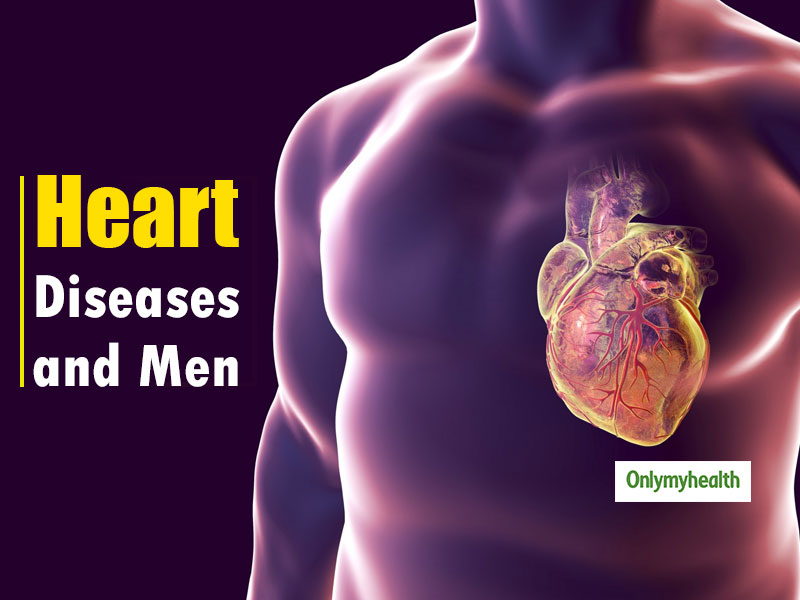
Mens health heart disease – Men’s health heart disease is a significant concern, affecting millions worldwide. Understanding the risks, symptoms, and treatment options is crucial for proactive health management. This comprehensive guide explores the various aspects of heart disease in men, from its prevalence and contributing factors to effective prevention strategies and treatment options.
This guide delves into the factors that increase a man’s risk for heart disease, including lifestyle choices, genetics, and underlying health conditions. It provides actionable insights into preventive measures and management strategies. Early detection and proactive measures are vital in maintaining optimal cardiovascular health.
Introduction to Men’s Health Heart Disease
Heart disease remains a significant health concern for men worldwide, posing a substantial threat to their well-being and longevity. The prevalence of cardiovascular issues in men often surpasses that in women, highlighting the critical need for proactive measures to mitigate risks and promote heart health. Understanding the factors contributing to this disparity and adopting preventative strategies is paramount.This escalating health crisis underscores the importance of men taking a proactive role in their heart health.
Knowledge of risk factors, coupled with lifestyle modifications, can significantly reduce the likelihood of developing heart disease. Furthermore, early detection through regular check-ups and screenings plays a crucial role in successful management and treatment.
Prevalence and Impact of Heart Disease in Men
Heart disease is a leading cause of death for men globally. Statistics consistently show a higher mortality rate from heart-related conditions in men compared to women. This difference is often attributed to various factors, including lifestyle choices and biological predispositions. The long-term impact of heart disease extends beyond mortality, encompassing reduced quality of life, disability, and significant economic burdens on individuals and families.
Factors Contributing to Heart Disease in Men
Several factors contribute to the development of heart disease in men. These include a combination of genetic predisposition, lifestyle choices, and environmental influences. Smoking, high blood pressure, high cholesterol, and a diet deficient in fruits and vegetables contribute significantly. Lack of physical activity, stress, and obesity are also major risk factors. Genetic predispositions, while not controllable, can still be mitigated through conscious lifestyle adjustments.
Importance of Early Detection and Prevention
Early detection and proactive prevention are crucial in managing heart disease effectively. Regular check-ups, including blood pressure and cholesterol screenings, can help identify potential issues early on. Adopting a heart-healthy lifestyle, such as maintaining a balanced diet, exercising regularly, and avoiding smoking, is essential in reducing risk factors.
Common Misconceptions about Heart Disease in Men
There are several misconceptions surrounding heart disease in men. One common misconception is that heart disease only affects older men. In reality, heart disease can affect men of all ages, and early detection and prevention are critical regardless of age. Another misconception is that only men with visible symptoms need to be concerned. Subtle symptoms may exist, and routine check-ups are crucial for early detection.
Types of Heart Disease Affecting Men
| Disease Type | Symptoms | Causes | Risk Factors |
|---|---|---|---|
| Coronary Artery Disease (CAD) | Chest pain (angina), shortness of breath, fatigue, dizziness, nausea | Plaque buildup in the coronary arteries, reducing blood flow to the heart | High cholesterol, high blood pressure, smoking, lack of exercise, diabetes, obesity, family history |
| Heart Failure | Shortness of breath, fatigue, swelling in the legs and ankles, rapid or irregular heartbeat | Weakening of the heart muscle, inability to pump blood effectively | High blood pressure, coronary artery disease, diabetes, obesity, alcohol abuse, family history |
| Arrhythmias | Palpitations, dizziness, fainting, chest pain, shortness of breath | Irregular heartbeats, often caused by electrical problems in the heart | High blood pressure, coronary artery disease, heart failure, stress, smoking, certain medications |
| Valve Disease | Shortness of breath, fatigue, chest pain, swelling in the legs and ankles, irregular heartbeat | Damage or dysfunction of heart valves, hindering blood flow | Rheumatic fever, congenital heart defects, high blood pressure, infections |
Risk Factors and Prevention
Heart disease remains a significant health concern for men worldwide. Understanding the risk factors and implementing preventive measures are crucial for maintaining cardiovascular health. Early detection and proactive management can significantly reduce the risk of developing serious heart conditions.A multitude of factors contribute to the development of heart disease in men. While some factors are beyond our control, many are modifiable through lifestyle changes and medical interventions.
Proactive measures, such as adopting a heart-healthy lifestyle and undergoing regular check-ups, can dramatically decrease the chances of developing heart disease.
Men’s heart health is a serious concern, and while traditional treatments are helpful, innovative approaches like implantable drug delivery systems are pushing the boundaries of treatment. For instance, research into implantable drugs is changing addiction treatment in exciting ways. Implantable drugs changing addiction treatment could potentially lead to similar advancements in treating heart conditions.
This could be a game changer for future preventative measures for heart disease in men.
Key Risk Factors
Several factors significantly increase the risk of heart disease in men. These include a family history of heart disease, high blood pressure, high cholesterol levels, and smoking. Age and ethnicity also play a role. Men over 45 are at higher risk, and certain ethnic groups may experience a higher prevalence of heart disease. Understanding these factors is crucial for personalized prevention strategies.
Modifiable Risk Factors and Management
Many risk factors are within a man’s control and can be managed effectively. High blood pressure, high cholesterol, and unhealthy dietary habits are prime examples. Maintaining a healthy weight, adopting a balanced diet rich in fruits, vegetables, and whole grains, and regular physical activity are crucial in mitigating these risks. Smoking cessation is paramount, as smoking significantly damages blood vessels and increases the risk of heart disease.
Stress management techniques, such as exercise and mindfulness practices, are also vital. Consulting with a healthcare professional for personalized advice and treatment plans is highly recommended.
Lifestyle Choices and Prevention
Lifestyle choices play a pivotal role in preventing heart disease. A diet rich in fruits, vegetables, and whole grains, coupled with regular physical activity, significantly reduces the risk of developing heart disease. Maintaining a healthy weight is equally important. Regular exercise not only improves cardiovascular health but also helps manage stress and maintain a healthy weight. Avoiding or limiting the consumption of saturated and trans fats, and reducing sodium intake are equally important dietary considerations.
Limiting alcohol consumption and quitting smoking are crucial for preventing heart disease. Furthermore, prioritizing stress management through relaxation techniques and regular sleep are essential for cardiovascular well-being.
Regular Check-ups and Screenings
Regular check-ups and screenings are vital for early detection of heart disease risk factors. These screenings can help identify potential problems before they become serious. Regular blood pressure and cholesterol checks, along with assessments of family history, are crucial steps in maintaining cardiovascular health. Healthcare professionals can provide personalized recommendations based on individual risk factors. Early intervention is key to successful management of heart disease risk factors.
Impact of Lifestyle Factors on Heart Health
| Lifestyle Factor | Impact on Heart Health | Strategies for Improvement |
|---|---|---|
| Diet (High in saturated/trans fats, processed foods) | Increases LDL cholesterol, contributing to plaque buildup in arteries. | Consume a diet rich in fruits, vegetables, whole grains, and lean proteins. Limit saturated and trans fats. |
| Physical Inactivity | Increases risk of obesity, high blood pressure, and high cholesterol. | Engage in regular physical activity, aiming for at least 150 minutes of moderate-intensity aerobic exercise per week. |
| Smoking | Damages blood vessels, increases blood pressure, and impairs blood flow. | Quit smoking. Seek support from healthcare professionals or support groups. |
| Obesity | Increases risk of high blood pressure, high cholesterol, and type 2 diabetes. | Maintain a healthy weight through a balanced diet and regular exercise. |
| High Blood Pressure | Damages blood vessels, increasing the risk of heart attack and stroke. | Follow a low-sodium diet, maintain a healthy weight, exercise regularly, and manage stress. |
| High Cholesterol | Contributes to plaque buildup in arteries, increasing the risk of heart attack and stroke. | Eat a healthy diet, exercise regularly, and consider medications if necessary. |
Symptoms and Diagnosis
Heart disease, while often insidious, can manifest with noticeable symptoms. Recognizing these signs is crucial for timely diagnosis and treatment. Understanding the nuances in symptoms between men and women is also important, as variations can exist. Early detection significantly improves outcomes.
Men’s health, particularly heart disease, is a serious concern. Many factors contribute, and access to quality healthcare plays a crucial role. Fortunately, telemedicine is revolutionizing how people with obesity, a major risk factor for heart disease, can access care. For example, how telemedicine makes healthcare more accessible for people with obesity shows how virtual consultations and remote monitoring tools are breaking down barriers, making it easier for people to manage their conditions and ultimately reduce their risk of heart disease.
This increased access is a vital step forward in addressing men’s health issues.
Common Symptoms in Men
Men often experience heart disease symptoms differently than women. Common symptoms include chest pain, often described as a pressure, tightness, or squeezing sensation. This pain can radiate to the jaw, neck, back, or arms. Shortness of breath, especially with exertion, is another frequent symptom. Other signs can include dizziness, nausea, and excessive sweating.
Symptoms in Men vs. Women
While chest pain is a common symptom in both men and women, women may experience symptoms less classically associated with heart disease. For instance, women may report unusual fatigue, indigestion, or back pain. These symptoms can sometimes be overlooked or dismissed as less significant, leading to delayed diagnosis. It’s crucial to be aware of the broader range of potential symptoms and to seek medical attention if concerned.
Diagnostic Procedures
Various diagnostic procedures are used to identify heart disease. These include electrocardiograms (ECGs), which measure the electrical activity of the heart. Stress tests evaluate how the heart responds to exertion. Cardiac catheterizations involve inserting a thin tube into a blood vessel to visualize the heart’s arteries and assess blood flow. Blood tests can also reveal markers indicative of heart disease, such as elevated cholesterol or triglycerides.
Warning Signs to Not Ignore
Persistent chest pain, particularly if accompanied by shortness of breath, nausea, or sweating, should never be ignored. Sudden dizziness or lightheadedness, along with unusual fatigue, are also cause for concern. Pain radiating to the arm, jaw, or back should prompt immediate medical attention. Any unexplained, persistent discomfort that worsens over time warrants a visit to a healthcare professional.
Differentiating Heart Attack Symptoms from Other Chest Pains
Differentiating a heart attack from other types of chest pain can be challenging. A key difference is the intensity and duration of the pain. Heart attack pain is often described as severe and persistent, lasting for more than a few minutes. Other chest pains might be intermittent or less intense. Additional symptoms, like shortness of breath, nausea, and sweating, often accompany a heart attack.
If uncertain, it’s always best to seek immediate medical evaluation. Never hesitate to call emergency services if you suspect a heart attack.
A heart attack is a medical emergency that requires immediate attention.
Treatment Options and Management
Heart disease, unfortunately, isn’t a one-size-fits-all condition. Effective management requires a personalized approach that considers individual factors, including the specific type of heart disease, the severity of the condition, and the patient’s overall health. This often involves a combination of medications, lifestyle modifications, and potentially, surgical interventions. Successful outcomes depend heavily on adherence to the prescribed treatment plan and a proactive approach to maintaining a healthy lifestyle.Treatment strategies for heart disease in men aim to reduce risk factors, manage symptoms, and prevent further complications.
This often includes a combination of medical interventions, lifestyle changes, and potentially surgical procedures. The goal is to improve quality of life and longevity.
Medications
Medication plays a crucial role in managing heart disease. Different types of medications address various aspects of the condition, from lowering cholesterol to regulating blood pressure and blood sugar levels. A cardiologist will prescribe the most appropriate medication(s) based on the individual’s specific needs.
| Medication Type | Mechanism of Action | Potential Side Effects |
|---|---|---|
| Statins | Lower LDL (“bad”) cholesterol by inhibiting its production in the liver. | Muscle pain (myalgia), liver damage, increased blood sugar levels. |
| Beta-blockers | Reduce heart rate and blood pressure by blocking the effects of adrenaline. | Fatigue, dizziness, depression, difficulty breathing. |
| ACE inhibitors | Lower blood pressure by relaxing blood vessels. | Dry cough, kidney problems, dizziness. |
| Diuretics | Increase urine production to lower blood pressure. | Dehydration, electrolyte imbalances. |
| Aspirin | Thins the blood to prevent blood clots. | Gastrointestinal bleeding, allergic reactions. |
Lifestyle Changes
Adopting a heart-healthy lifestyle is essential for managing heart disease. This involves making significant changes in diet, exercise, and stress management. Consistent, moderate-intensity exercise, a balanced diet rich in fruits, vegetables, and whole grains, and stress-reducing activities are key to improving overall health.
- Dietary Changes: A diet rich in fruits, vegetables, and whole grains, along with lean protein sources, is crucial for heart health. Limiting saturated and trans fats, cholesterol, and sodium intake is equally important.
- Physical Activity: Regular physical activity, such as brisk walking, jogging, swimming, or cycling, strengthens the heart and improves cardiovascular health. Aim for at least 150 minutes of moderate-intensity or 75 minutes of vigorous-intensity aerobic activity per week, along with muscle-strengthening activities.
- Stress Management: Chronic stress can negatively impact heart health. Practices like meditation, yoga, deep breathing exercises, or spending time in nature can help manage stress levels.
Surgical Interventions
In some cases, surgical interventions may be necessary to treat heart disease. These procedures can repair or replace damaged heart structures, improve blood flow, or correct rhythm problems. Examples include coronary artery bypass grafting (CABG) and angioplasty. The decision to pursue surgical intervention is made by a cardiologist in consultation with the patient, considering the severity of the condition and the individual’s overall health.
Cardiac Rehabilitation Programs
Cardiac rehabilitation programs play a vital role in the recovery and long-term management of heart disease. These programs provide structured exercise routines, dietary guidance, and psychological support to help patients regain their physical and emotional well-being. These programs are tailored to each individual’s needs and recovery stage.
- Benefits: Cardiac rehabilitation programs often lead to improved cardiovascular fitness, reduced risk of future heart events, and enhanced quality of life. They provide support and guidance in implementing long-term lifestyle changes.
Patient Stories
Many men have successfully managed heart disease through a combination of treatment options and lifestyle changes. One example is a man who made significant dietary changes, increased physical activity, and followed his prescribed medication regimen. This led to a marked improvement in his heart health and an overall enhanced quality of life. These examples demonstrate the positive impact of proactive and consistent management strategies.
Men’s Heart Health and Mental Well-being
Men’s heart health is intricately linked to their mental well-being. Chronic stress, anxiety, and depression can significantly increase the risk of heart disease, impacting everything from blood pressure to cholesterol levels. Understanding this connection is crucial for proactive measures to safeguard both mental and cardiovascular health.The relationship between mental health and heart disease risk in men is well-documented.
Studies have consistently shown a correlation between heightened stress levels, anxiety, and depression, and an increased likelihood of developing cardiovascular problems. This is not simply a coincidence; these mental states trigger physiological responses that negatively affect the heart.
The Impact of Stress, Anxiety, and Depression on Cardiovascular Health
Prolonged stress activates the body’s “fight-or-flight” response, leading to elevated heart rate, blood pressure, and cortisol levels. These elevated levels, if sustained, can damage blood vessels, promoting the buildup of plaque and increasing the risk of heart attacks and strokes. Similarly, anxiety disorders and depression can disrupt sleep patterns, contribute to unhealthy eating habits, and discourage physical activity, all of which exacerbate cardiovascular risk.
Strategies for Managing Stress and Promoting Mental Well-being
Effective stress management is crucial for mitigating the impact on heart health. Adopting healthy coping mechanisms is paramount. These strategies encompass a multifaceted approach. Prioritizing regular exercise, maintaining a balanced diet, and practicing mindfulness techniques like meditation or deep breathing can significantly reduce stress and improve overall mental well-being. Social connections and support systems play a vital role as well.
Seeking support from friends, family, or a therapist is a proactive step towards effectively managing stress and promoting mental health. Furthermore, recognizing and addressing underlying mental health concerns is equally important.
Resources for Men Seeking Support for Their Mental Health
Accessing appropriate resources is vital for men seeking help for their mental well-being. Local community centers, mental health organizations, and online platforms offer various support programs, including counseling services and support groups. Talking to a healthcare professional is the first step in understanding individual needs and accessing suitable resources.
Comparison of Stress Management Techniques on Heart Rate Variability
| Stress Management Technique | Effect on Heart Rate Variability | Effectiveness Level |
|---|---|---|
| Mindfulness Meditation | Increased heart rate variability, indicating improved parasympathetic nervous system activity and reduced stress response. | High |
| Progressive Muscle Relaxation | Increased heart rate variability, promoting relaxation and reducing muscle tension, thus reducing stress response. | Moderate |
| Yoga | Increased heart rate variability, improving overall physical and mental well-being, thus reducing stress response. | High |
| Aerobic Exercise | Increased heart rate variability, reducing stress hormones and improving cardiovascular health, resulting in a better stress response. | High |
| Cognitive Behavioral Therapy (CBT) | Potentially increased heart rate variability, addressing negative thought patterns and improving emotional regulation, leading to a better stress response. | High |
Note: Heart rate variability (HRV) is a measure of the variation in time between heartbeats. Higher HRV generally indicates a healthier and more adaptable stress response. Effectiveness levels are subjective and vary based on individual factors. Consult with a healthcare professional for personalized guidance.
Cultural and Societal Factors

Cultural norms and societal expectations play a significant role in shaping men’s health behaviors, including their approach to heart disease. Societal pressures often discourage men from openly discussing health concerns, impacting their willingness to seek help and leading to delayed diagnoses and treatment. This often stems from deeply ingrained cultural ideals about masculinity, which may prioritize stoicism and self-reliance over vulnerability and seeking assistance.
These factors can have profound consequences on the overall health outcomes of men.
Societal Pressures on Seeking Help
Societal pressures often discourage men from openly discussing health concerns, including heart disease. These pressures stem from deeply rooted cultural ideals about masculinity, which often prioritize stoicism, self-reliance, and emotional suppression over vulnerability and seeking assistance. This reluctance to admit weakness or seek help can lead to delayed diagnoses and treatment, ultimately impacting their health outcomes.
Men’s health and heart disease are serious concerns, and diet plays a crucial role. Choosing the right bread can significantly impact heart health, and figuring out if pita bread is gluten-free is important for many dietary needs. Is pita bread gluten free ? Knowing this helps determine if it’s a suitable part of a heart-healthy diet.
Ultimately, focusing on a balanced diet and regular check-ups are key to maintaining good heart health.
Cultural Influences on Dietary Habits
Cultural norms significantly influence dietary habits, which can affect heart health. In some cultures, traditional diets may include high levels of saturated fats and processed foods, increasing the risk of cardiovascular disease. Conversely, other cultures may emphasize fresh, whole foods, promoting heart health. For example, some cultures may have strong traditions around specific types of meat consumption or the use of certain oils in cooking, which can influence dietary patterns and consequently, cardiovascular health.
Understanding these cultural factors is crucial for developing targeted interventions that promote healthier eating habits within diverse populations.
Importance of Culturally Sensitive Healthcare Approaches
Culturally sensitive healthcare approaches are crucial for effectively addressing heart disease in men. Health providers should understand and acknowledge the diverse cultural backgrounds of their patients, recognizing that cultural beliefs and practices may influence health behaviors and perceptions of illness. This includes recognizing the diverse ways in which men express pain and discomfort, as well as the different levels of comfort they may have with discussing personal health concerns with healthcare professionals.
A culturally sensitive approach recognizes and respects the unique experiences and needs of each individual.
Common Misconceptions About Men’s Health and Heart Disease
Understanding common misconceptions about men’s health and heart disease is essential for promoting awareness and effective interventions. These misconceptions vary across cultures and can hinder preventative measures and early detection.
- Misconception: Heart disease is primarily a women’s health issue.
Reality: Heart disease is a significant concern for men, often leading to premature death if left undiagnosed and untreated. While women may experience heart disease differently, it remains a significant health risk for both genders. - Misconception: Men don’t experience the same symptoms of heart disease as women.
Reality: While some symptoms may manifest differently in men and women, chest pain isn’t the only indicator. Other symptoms like shortness of breath, fatigue, and pain in the arms, neck, or jaw are also possible. Understanding the full spectrum of symptoms is vital for early detection. - Misconception: Men are less likely to experience heart attacks.
Reality: Men are more prone to experience a heart attack, often at a younger age, compared to women. This disparity is often related to cultural factors, socioeconomic conditions, and health-seeking behaviors. - Misconception: Men don’t need to be concerned about heart health until later in life.
Reality: Heart health is a lifelong concern. Lifestyle choices and risk factors can affect heart health at any age, and preventative measures should be implemented early to mitigate the risk of future heart problems. - Misconception: Heart disease is inevitable for men.
Reality: Heart disease is not an inevitable outcome. Adopting a healthy lifestyle, managing risk factors, and seeking appropriate medical attention can significantly reduce the risk of developing heart disease.
Heart Health and Diet

A healthy diet is crucial for maintaining heart health, especially for men. Heart disease is a significant concern for men, and dietary choices play a pivotal role in managing risk factors and promoting cardiovascular well-being. This section delves into the importance of specific dietary approaches and provides examples of heart-healthy foods to support optimal heart health.A balanced and nutritious diet can significantly reduce the risk of heart disease.
A diet rich in fruits, vegetables, whole grains, and lean proteins, while limiting saturated and trans fats, cholesterol, and sodium, is key. Choosing the right foods and understanding how different dietary patterns affect heart health can empower men to take proactive steps towards a healthier lifestyle.
Importance of a Healthy Diet
A heart-healthy diet is essential for maintaining healthy cholesterol levels, blood pressure, and weight, all of which directly influence the risk of developing heart disease. A nutritious diet can also help manage existing conditions and reduce the risk of developing complications. The impact of diet on overall health is well-documented, and its role in cardiovascular health is particularly significant.
Heart-Healthy Food Choices
Numerous foods contribute to a heart-healthy diet. Fruits and vegetables, rich in vitamins, minerals, and antioxidants, are excellent choices. Lean proteins, such as fish, poultry, and beans, provide essential amino acids without excessive saturated fat. Whole grains, providing fiber and complex carbohydrates, promote healthy digestion and blood sugar control. These foods are fundamental components of a heart-healthy diet.
Dietary Approaches
Various dietary approaches, each with its own focus, can be beneficial for heart health.
- Mediterranean Diet: This diet emphasizes fruits, vegetables, whole grains, legumes, nuts, and healthy fats like olive oil. It generally restricts red meat and processed foods. The Mediterranean diet is associated with a reduced risk of heart disease due to its emphasis on nutrient-rich foods and healthy fats.
- DASH Diet (Dietary Approaches to Stop Hypertension): This diet focuses on reducing blood pressure by limiting sodium intake and increasing potassium, magnesium, and calcium. It promotes fruits, vegetables, low-fat dairy, and whole grains. The DASH diet is specifically designed to manage hypertension, a significant risk factor for heart disease.
- Other Considerations: Individual needs and preferences should be considered when selecting a dietary approach. Consulting with a healthcare professional or registered dietitian can provide personalized recommendations based on individual circumstances.
Role of Nutrition in Managing Risk Factors
Nutrition plays a crucial role in managing risk factors for heart disease. Maintaining a healthy weight, controlling blood pressure, and managing cholesterol levels are directly influenced by dietary choices. A balanced diet can effectively mitigate these risk factors and contribute to a healthier heart.
Nutritional Content of Heart-Healthy Foods
| Food Item | Key Nutrients | Nutritional Benefits |
|---|---|---|
| Fatty Fish (Salmon, Tuna) | Omega-3 fatty acids, Vitamin D | Reduce inflammation, lower triglycerides, support heart function |
| Fruits and Vegetables | Vitamins, minerals, antioxidants | Boost immunity, support overall health, aid in reducing inflammation |
| Whole Grains (Oats, Brown Rice) | Fiber, complex carbohydrates | Improve digestion, regulate blood sugar, promote satiety |
| Legumes (Beans, Lentils) | Fiber, protein, iron | Support digestion, provide sustained energy, aid in blood sugar control |
| Nuts and Seeds | Healthy fats, protein, fiber | Promote heart health, reduce inflammation, support overall well-being |
Heart Health and Exercise: Mens Health Heart Disease
Moving your body regularly is crucial for men’s heart health. Physical activity strengthens the heart muscle, improves blood flow, and helps manage weight, all of which contribute to a lower risk of heart disease. A consistent exercise routine can also positively impact blood pressure, cholesterol levels, and overall well-being.Exercise isn’t just about avoiding heart disease; it’s about boosting your overall vitality and resilience.
Regular physical activity can lead to a greater sense of energy and improved sleep quality. The benefits extend beyond the cardiovascular system, affecting mood, cognitive function, and stress management.
Types of Exercise for Heart Health
Engaging in a variety of activities is key to a well-rounded exercise program. This helps prevent boredom and ensures that different muscle groups are targeted. Cardiovascular exercise is particularly important for heart health.
- Aerobic Exercise: Activities like brisk walking, jogging, swimming, cycling, and dancing improve heart function and lung capacity. These activities increase the heart rate and breathing, strengthening the cardiovascular system.
- Strength Training: Lifting weights, using resistance bands, or bodyweight exercises build muscle mass and strength. This helps manage weight and improves metabolism, indirectly supporting heart health.
- Flexibility and Balance Exercises: Yoga, Pilates, and tai chi enhance flexibility, balance, and coordination. These activities can reduce the risk of falls and injuries, promoting overall well-being and contributing to heart health indirectly.
Benefits of Physical Activity, Mens health heart disease
Regular exercise reduces several key risk factors for heart disease. By improving these factors, you significantly lower your chances of developing cardiovascular issues.
- Improved Cholesterol Levels: Exercise helps raise “good” HDL cholesterol and lower “bad” LDL cholesterol, reducing the risk of plaque buildup in the arteries.
- Lowered Blood Pressure: Physical activity can help lower both systolic and diastolic blood pressure, reducing the strain on the heart.
- Weight Management: Exercise burns calories, which helps maintain a healthy weight. Excess weight puts extra strain on the heart and increases the risk of heart disease.
- Reduced Stress: Physical activity can help manage stress, a known risk factor for heart disease. Stress can elevate blood pressure and increase the risk of heart attack.
Designing an Exercise Program
Creating a personalized exercise program tailored to your needs and fitness level is essential for optimal results.
- Consult a Healthcare Professional: Before starting any new exercise program, it’s crucial to consult your doctor, especially if you have any pre-existing health conditions.
- Set Realistic Goals: Start slowly and gradually increase the intensity and duration of your workouts. Aim for at least 150 minutes of moderate-intensity or 75 minutes of vigorous-intensity aerobic activity per week, along with muscle-strengthening activities on two or more days a week.
- Choose Activities You Enjoy: Select exercises that you find enjoyable to maintain consistency. This will help you stay motivated and committed to your program.
- Warm-up and Cool-down: Always include warm-up exercises before each workout to prepare your body and cool-down exercises afterward to help your body recover.
Exercise Routines for Different Fitness Levels
Example routines, adaptable to different fitness levels, can help you structure your workouts effectively.
| Fitness Level | Example Routine (3 times per week) |
|---|---|
| Beginner | 30 minutes of brisk walking on a flat surface, 20 minutes of stretching, and 10 minutes of light strength training with bodyweight exercises. |
| Intermediate | 45 minutes of jogging or cycling, 15 minutes of strength training using light weights, and 15 minutes of yoga or Pilates. |
| Advanced | 60 minutes of running or high-intensity interval training (HIIT), 30 minutes of weightlifting with heavier weights, and 15 minutes of dynamic stretching. |
Closure
In conclusion, men’s health heart disease is a multifaceted issue requiring a holistic approach. By understanding the risks, symptoms, and treatment options, men can take proactive steps to protect their heart health. This guide has provided valuable information on the importance of lifestyle modifications, early detection, and seeking professional help. Ultimately, a combination of knowledge, preventative measures, and appropriate medical interventions can significantly reduce the risk of heart disease in men.





